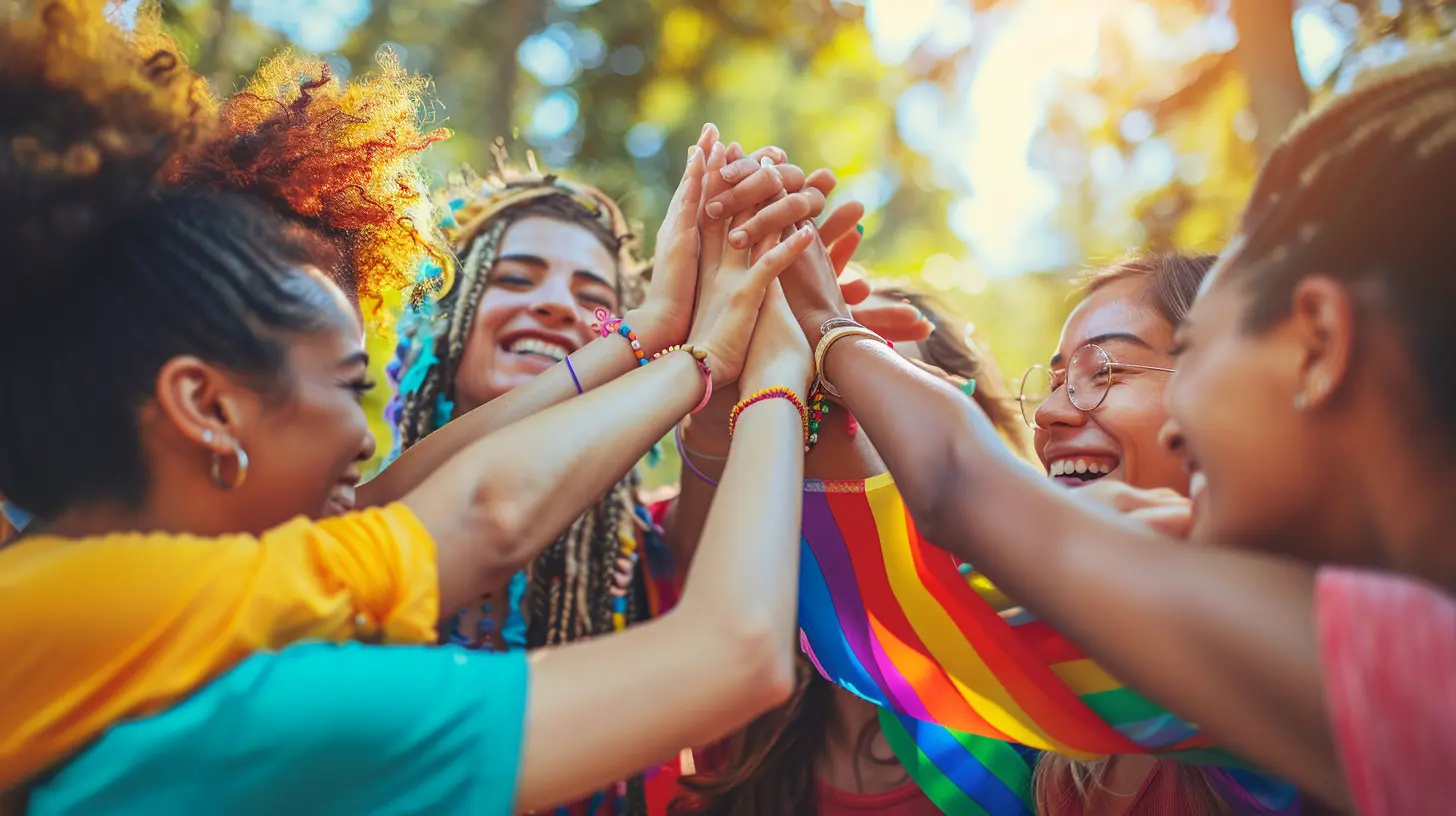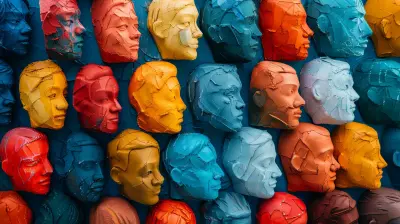Group Therapy for LGBTQ+ Individuals: Finding Acceptance
22 February 2025
Navigating the world as an LGBTQ+ individual can be challenging on multiple levels. From personal struggles with identity, societal pressures, family dynamics, to even the stigma associated with mental health, it’s a lot. But guess what? You don’t have to go through it alone. One powerful tool that’s helping many LGBTQ+ individuals find acceptance and healing is group therapy.
In this article, we’ll dive deep into what group therapy is, how it benefits LGBTQ+ individuals, and why it’s such a valuable space for finding acceptance. Whether you’re part of the LGBTQ+ community, a mental health advocate, or simply curious, this piece is for you.

What is Group Therapy?
So, let’s start with the basics. Group therapy is a type of psychotherapy where a small group of individuals meets regularly to discuss and explore their feelings, thoughts, and experiences under the guidance of a trained therapist. Unlike individual therapy, where it’s just you and a therapist, group therapy includes a handful of other people who might be dealing with similar issues.In the context of LGBTQ+ individuals, group therapy often consists of people from the community who are also grappling with some of the same struggles — whether it’s coming out, gender dysphoria, discrimination, or even relationship issues. The beauty of this setup? It creates a safe space where members can connect, share experiences, and support one another.
Why Group Therapy is Especially Valuable for LGBTQ+ Individuals
Imagine being in a room where people get you — not because they’ve read about your experiences, but because they’ve lived them. That’s the essence of group therapy for LGBTQ+ folks. There’s no need to explain the nuances of your identity or worry about judgment. Everyone there is on a similar journey, and that shared understanding can be incredibly powerful.Here’s why group therapy is a game-changer for LGBTQ+ individuals:
1. Shared Experiences
One of the biggest benefits of group therapy is the opportunity to relate to others. When you’re in a room full of people who have been through similar challenges, you no longer feel isolated. Whether it’s the anxiety of coming out or dealing with societal rejection, hearing others’ stories can validate your own experiences.
2. Reduced Feelings of Isolation
Let’s be real — being LGBTQ+ can sometimes feel like you’re on an island, especially if you don’t have an accepting family or community. Group therapy offers a lifeline, a reminder that you’re not alone. You’re part of a community that understands you, supports you, and is rooting for your well-being.
3. Building a Support Network
Making friends as an adult is hard enough, but even more so when you’re navigating the complexities of being LGBTQ+. Group therapy can serve as a ground for building meaningful connections. Some members of the group might even become lifelong friends or confidants.
4. Learning Coping Strategies
In group therapy, you don’t just talk about your problems. You also learn practical ways to cope with them. Whether it’s managing anxiety, dealing with family rejection, or handling workplace discrimination, hearing how others have tackled similar issues can be enlightening. Plus, the therapist guiding the group often provides professional strategies to help you manage your mental health.
5. Empowerment Through Vulnerability
Vulnerability is often seen as a weakness in our society, but in group therapy, it’s a strength. By sharing your story and listening to others, you build emotional resilience. You realize that being open about your struggles doesn’t make you weak; it makes you strong. It’s incredibly empowering to show up as your authentic self, scars and all, and still be accepted.
The Unique Challenges LGBTQ+ Individuals Face
To truly understand the impact of group therapy, it’s essential to recognize the unique challenges that LGBTQ+ individuals face. While every person’s experience is different, there are common threads that many in the community deal with.1. Discrimination and Stigma
Unfortunately, even in today’s more progressive world, LGBTQ+ individuals still face discrimination. Whether it’s outright homophobia or more subtle forms of bias, these experiences can take a toll on mental health. Group therapy provides a space to unpack these feelings, seek validation, and develop coping strategies to deal with the outside world.2. Internalized Homophobia or Transphobia
Growing up in a society that often marginalizes LGBTQ+ people can lead to internalized homophobia or transphobia. This is when individuals begin to subconsciously adopt the negative beliefs that society holds about their identity. In group therapy, many LGBTQ+ members find solace in knowing they aren’t alone in these feelings and learn how to challenge these internalized beliefs.3. Family Rejection
One of the most painful experiences for LGBTQ+ individuals can be family rejection. Whether it’s subtle disapproval or outright exclusion, being rejected by the people who are supposed to love you unconditionally can be devastating. Group therapy offers a safe space to grieve, process, and heal from these wounds.4. Mental Health Disparities
Studies have consistently shown that LGBTQ+ individuals are at a higher risk for mental health issues like depression and anxiety. Factors like discrimination, societal pressures, and family rejection play a role. But in group therapy, members learn that struggling with mental health doesn’t make them “broken” — it’s a response to living in a world that hasn’t always been kind to them.
How Group Therapy Fosters Acceptance
It’s one thing to talk about the benefits of group therapy, but how exactly does it foster acceptance — both self-acceptance and acceptance from others? Let’s break it down.1. Facilitated by a Professional
One of the key aspects of group therapy is that it’s led by a trained therapist. This person ensures that the group remains a safe, supportive environment. They guide discussions, offer valuable insights, and help members navigate their emotions in a constructive way. Knowing that a professional is there to lead the group brings a sense of security, allowing members to open up more freely.2. Challenging Negative Beliefs
Many LGBTQ+ individuals struggle with negative self-perceptions, whether it’s due to societal pressures or personal experiences. In group therapy, these beliefs are often brought to light and challenged. For example, if someone shares that they feel unworthy of love because of their identity, other group members might offer their own stories of overcoming similar feelings. This collective support can help break down harmful beliefs and replace them with more positive, affirming perspectives.3. Learning to Give and Receive Support
Group therapy isn’t just about receiving support; it’s also about giving it. There’s something powerful about hearing someone else’s story and offering words of encouragement. It makes you realize that you, too, have valuable insights to share. This dynamic fosters a sense of mutual respect and acceptance within the group, and it extends beyond the therapy room into other areas of life.4. Seeing Progress in Others
One of the most inspiring aspects of group therapy is seeing other members make progress. Maybe someone in the group shares a major life milestone, like coming out to their family or starting hormone therapy. Their success can serve as a beacon of hope, showing you what’s possible. It’s a reminder that acceptance and growth are attainable for you, too.
Finding the Right Group Therapy for LGBTQ+ Individuals
Okay, so by now, you might be thinking, “This sounds great, but how do I actually find a group therapy session that’s right for me?”Here are some steps to help you get started:
1. Look for LGBTQ+-Specific Groups
Many therapists and mental health organizations offer group therapy specifically for LGBTQ+ individuals. These groups are often tailored to address the unique challenges faced by the community. Google is your friend here, but you can also check with local LGBTQ+ centers or online platforms like Psychology Today.2. Ask for Referrals
If you’re already seeing a therapist or counselor, ask them if they can recommend any group therapy sessions for LGBTQ+ individuals. They likely have connections within the mental health community and can point you in the right direction.3. Try Online Therapy
Thanks to the rise of telehealth, many group therapy sessions are now available online. This can be especially beneficial if you live in a more rural area or don’t have access to LGBTQ+-specific therapy groups nearby. Services like BetterHelp or Pride Counseling offer group therapy specifically for LGBTQ+ individuals.4. Attend a Trial Session
Many group therapy programs allow you to attend a trial session to see if it’s the right fit for you. Don’t be afraid to shop around — finding the right group is essential to making the most out of the experience.Wrapping It Up: Finding Acceptance Through Group Therapy
At the end of the day, group therapy for LGBTQ+ individuals is more than just a space to talk about problems — it’s a place to find connection, support, and most importantly, acceptance. Whether you’re struggling with self-acceptance or seeking a community that understands your journey, group therapy can be a transformative experience.Remember, you’re not alone. There’s a whole community out there ready to listen, support, and walk alongside you as you navigate life’s challenges. So, why not take that first step and explore group therapy? You might just find the acceptance you’ve been searching for.
all images in this post were generated using AI tools
Category:
Group TherapyAuthor:

Jenna Richardson
Discussion
rate this article
7 comments
Jax McIntire
This article beautifully captures the essential role of group therapy in fostering acceptance and community for LGBTQ+ individuals. It highlights the power of shared experiences and understanding. Thank you for shedding light on such an important topic—it's a crucial step toward healing and empowerment for many.
March 9, 2025 at 5:28 PM

Jenna Richardson
Thank you for your kind words! I'm glad the article resonated with you and helped highlight the importance of group therapy in fostering acceptance and community for LGBTQ+ individuals.
Zephyrae McWain
Thank you for highlighting the importance of group therapy for LGBTQ+ individuals. It truly fosters acceptance, connection, and healing in a safe and supportive environment.
March 7, 2025 at 4:30 PM

Jenna Richardson
Thank you for your thoughtful comment! I'm glad you found the article meaningful. Group therapy can indeed create a vital space for connection and healing.
Mallory Monroe
Group therapy for LGBTQ+ individuals: where you can finally be your fabulous self without fear of judgment. It’s like a support group meets a fabulous cocktail party—everyone's sharing their stories, sipping on emotional growth, and nobody asks about your last awkward date!
March 3, 2025 at 5:02 PM

Jenna Richardson
Absolutely! Group therapy creates a safe space for LGBTQ+ individuals to embrace their authentic selves, share experiences, and foster meaningful connections—all while enjoying the journey of emotional growth together.
Julianne Robinson
Group therapy fosters community and acceptance, promoting healing for LGBTQ+.
March 1, 2025 at 5:29 AM

Jenna Richardson
Absolutely! Group therapy creates a safe space that nurtures connection and understanding, essential for healing in the LGBTQ+ community.
Aelith McCaffrey
Group therapy offers LGBTQ+ individuals a vital space for acceptance, connection, and healing, fostering resilience and community in shared experiences.
February 27, 2025 at 5:40 AM

Jenna Richardson
Thank you for your insightful comment! I completely agree—group therapy provides essential support and connection for LGBTQ+ individuals, fostering resilience through shared experiences.
Amber McGhee
Group therapy: where hugs are free and judgment isn’t!
February 26, 2025 at 3:50 AM

Jenna Richardson
Absolutely! Group therapy provides a safe space for genuine support and understanding.
Audra McGhee
Embrace your journey and the strength of community. Together, we heal and find acceptance, empowering each other along the way!
February 23, 2025 at 5:14 PM

Jenna Richardson
Thank you! Embracing our journeys and supporting one another is essential for healing and finding acceptance in our community. Together, we are stronger!
MORE POSTS

The Psychology of Procrastination: Behavioral Insights and Solutions

How Psychoanalysis Approaches Anxiety and Neurosis

The Challenges of Bipolar Disorder and Substance Abuse

Group Therapy for PTSD: Healing in Community

The Psychology of Charisma: What Makes Some People So Likeable?

Raising Empathetic Children: The Science Behind Compassion